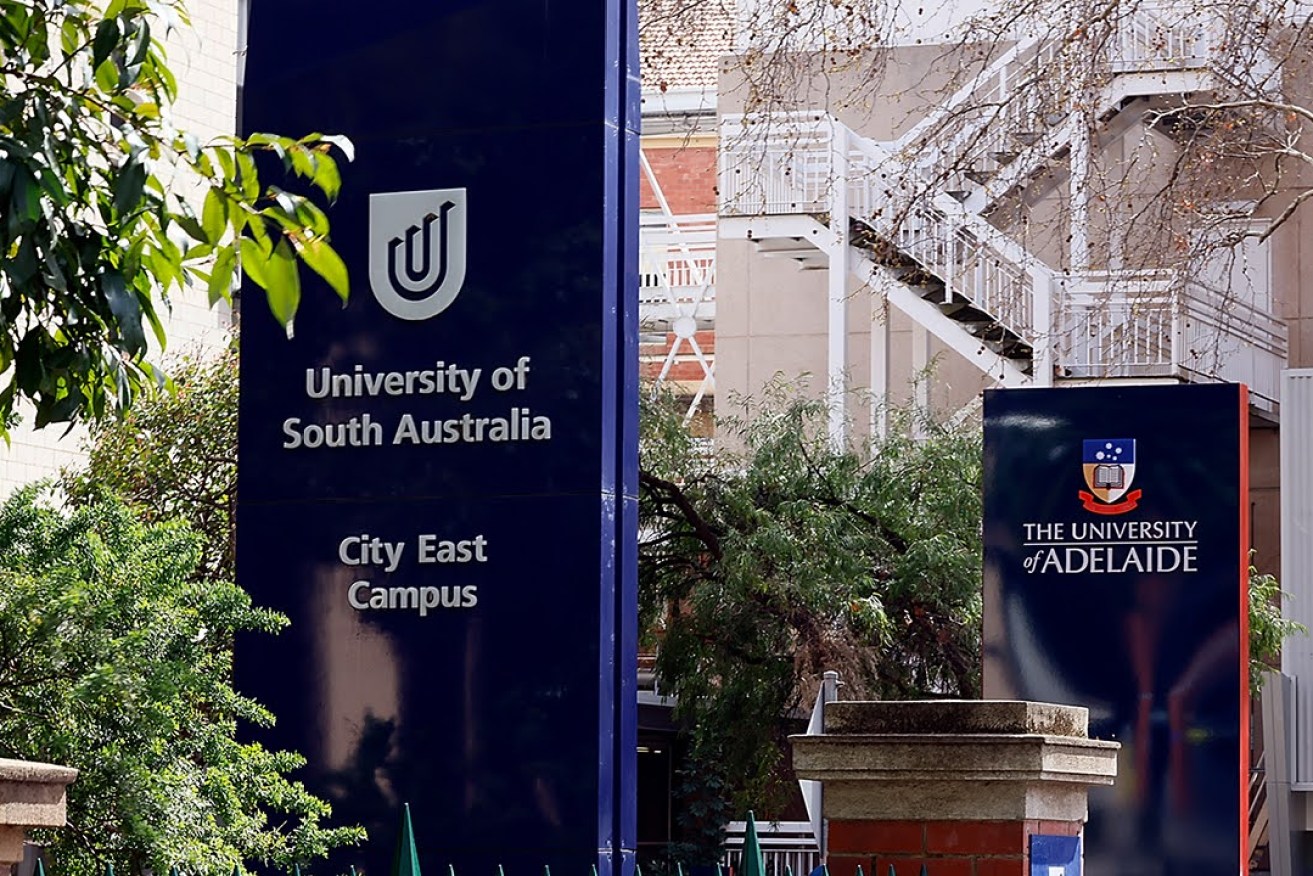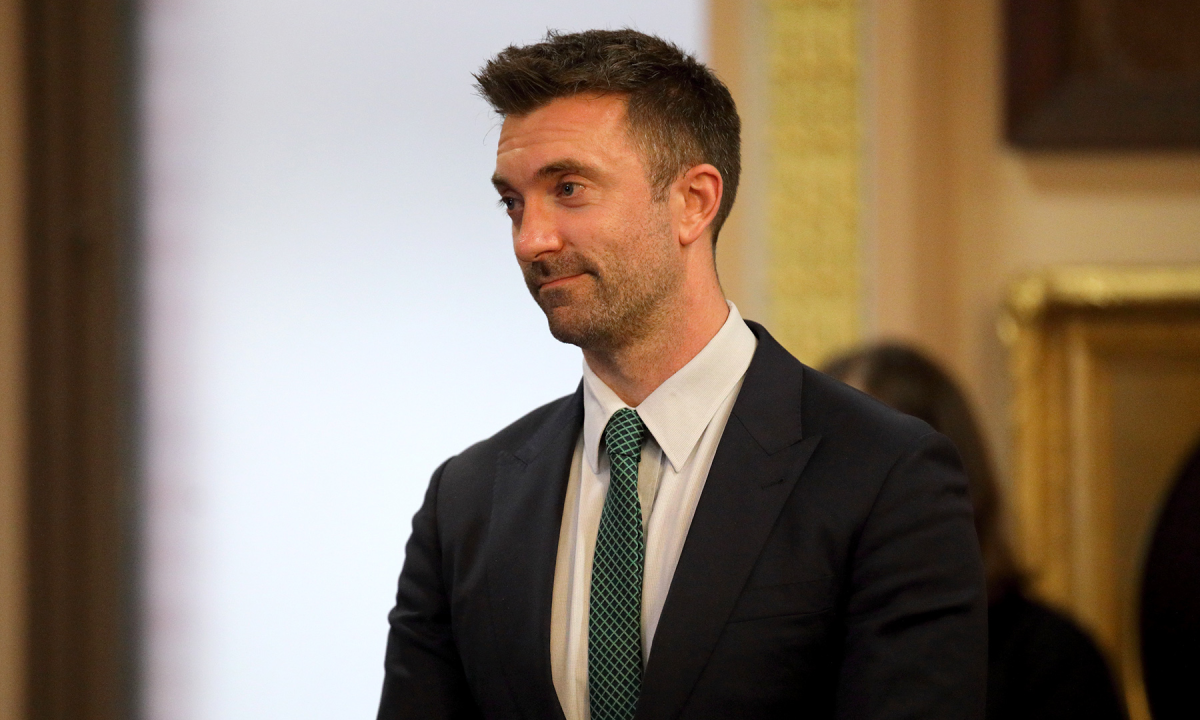Greens pitch SA uni governance shake-up as ‘alternative’ to merger
South Australian universities would be forced to appoint more students and staff to their councils, and hold meetings in public, under proposed governance reforms to be introduced to state parliament by the Greens as an “alternative” to a merger.

Photo: Tony Lewis/InDaily
Greens MLC and higher education spokesperson Robert Simms told InDaily he would introduce his Statutes Amendment (Universities) Bill 2022 to parliament when it resumes next month.
The Bill proposes to amend the Flinders University, University of Adelaide and University of South Australia Acts to force the institutions to conduct their council meetings in public and to ensure the governing bodies comprise what Simms said would be a “much more representative” mix of members.
Simms touted the Bill as an “alternative” to the proposed merger between the universities of Adelaide and South Australia, arguing an amalgamation could lead to job and course cuts.
Both universities signed a merger agreement with the state government in December, with their vice-chancellors at the time insisting that there would be “no net job losses as a consequence of creating the combined university”.
“Higher education is at a real crossroads in SA,” Simms said.
“We can head down the path of mergers advocated by the Labor Government, which will inevitably result in more job cuts and a dud deal for students, or we can look at how we can reform our universities to make them better public institutions.
“I’m putting this forward now as an alternative to what the Labor Party’s suggesting.”
One of the key changes proposed in Simms’ Bill is reshaping the universities’ governing councils.
Currently, all three universities are required to appoint their chancellor, vice-chancellor, academic board presiding member (or academic senate presiding member), one member of academic staff, one member of general staff, one postgraduate student and one undergraduate student, as well as one person co-opted and appointed to their councils.
The University of Adelaide must also appoint a graduate to its council.
The rest of the membership is made up of eight people (seven for the University of Adelaide) appointed by the councils.
“If you look at the three universities, there’s certainly an overrepresentation of people from the fossil fuel sector, people from finance, banking, accounting sectors, and also people from the defence industry,” Simms argued.
“Whilst I make no criticism of people who are volunteering their time to be on these important bodies, I do think we need to see a much more representative make-up of those councils.”
Simms’ Bill proposes that university councils comprise:
- The chancellor
- The vice-chancellor
- The presiding member of the academic board/academic senate
- The pro-vice chancellor (Indigenous) – the title differs slightly for each university
- Two members of academic staff
- Two members of general staff
- Three students of the university (at least one undergraduate and one postgraduate)
- Three graduates of the university
- Four members appointed by the council
The Greens MLC said at least two members would have to come from a culturally and linguistically diverse (CALD) background.
He said the proposed composition would restore the level of student and staff representation on university councils before changes passed under the Weatherill Government in 2017.
“Students pay a lot of money to go to university and really they should have a say on the direction the institution takes,” Simms said.
“We are also moving to ensure a better distribution of skills and experiences at the university council level – requiring First Nations representation and representation from CALD people and people from different work backgrounds.”

Robert Simms. Photo: Tony Lewis / InDaily
Other proposed changes in the Bill include forcing universities to hold their council meetings in public with three days’ notice and publishing their minutes, adopting a council member code of conduct, and preventing universities from holding assets and investments in fossil fuel companies.
The Bill also proposes to cap vice-chancellor salaries in line with the remuneration of the South Australian Premier – a change that Simms tried to get up with an older Bill he introduced in 2021.
Deputy Premier Susan Close, who holds the higher education ministerial portfolio, said it was “premature” to introduce a bill for university reform while the universities of Adelaide and South Australia worked towards what she described as “one of the most significant changes to higher education in South Australia”.
She said should a university merger proceed, it would require a new act of parliament to replace the acts that currently establish those two universities.
“The composition of the new university council will be part of that new act,” she said.
The Opposition’s education spokesperson John Gardner said he was yet to see Simms’ bill, but would “consider its contents in due course”.
He said the Opposition was “adamant” that a university merger should only proceed if the universities of Adelaide and South Australia were happy to combine.
Both universities announced in December that they would commission a feasibility study and business case for a merger which, if it goes ahead, would create the biggest university in the country for domestic students.
Should a final decision be made to merge, the combined institution would be called Adelaide University and would be operational from January 2026.
The state government offered an unspecified financial sweetener to the institutions to “maximise the transformational opportunities being pursued”, but Close earlier this week said no taxpayer money had yet been spent.
The vice-chancellors of the Universities of Adelaide and South Australia, Peter Høj and David Lloyd, told InDaily in December that they approached Flinders to take part in the merger discussions, but their overture was rejected.




